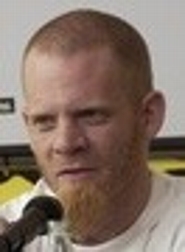
Mark Zupan, captain of the U.S. Quadriplegic Rugby Team and star of the critically acclaimed documentary Murderball, spoke at Hamilton on October 16. This event was sponsored by the Dean of Student's Office, The President's Office and the Campus Activities Board.
Zupan, now a civil engineer in Austin, has become one of the premiere quad rugby players in the U.S. In 2002 he was voted Quad Rugby Player of the Year, and in 2004 he was a starter for Team USA at the Paralympics in Athens, Greece, where he led the team to a Bronze medal. Zupan has captured four Most Valuable Player awards at tournaments held around the country and was just recently named U.S. Quad Rugby Associations Athlete of the Year.
Zupan spoke about his injury and how he has gone on with his life since becoming a quadriplegic and being restricted to a wheelchair. He said that moving five times in 13 years while growing up helped him to deal with his injury. "[Moving so much] helped me to branch out…being put in awkward positions helped," he said.
Zupan's accident happened 13 years ago, in October 1993, when he was 18. He was a freshman at Florida Atlantic University and a starting soccer player. The day of the accident, his father was at his soccer game. "If he had stayed," said Zupan, "life would be totally different." After the game Zupan and some friends went to the soccer house and then out to a bar. Even though his ID showed he was only 18, Zupan somehow ended up with a wristband indicating he was 21 and was able to buy alcohol.
Hours later he wandered out of the bar and passed out in the back of a friend's truck. His friend later left the bar and drove home, without ever realizing Zupan was in the back. He lost control of the car on an off-ramp and Zupan was thrown from the truck into a canal; however, no one knew he was in the car to begin with, and the friend was arrested for drunk driving.
Zupan woke up later in the morning, when it was light out. He called for help and was eventually heard by an employee in a nearby office building, who called 911. When the rescue team finally got him out of the canal, he was unconscious. They determined he had been in the water for 13 ½ hours. When his father later talked to the fire chief he was told, "I don't know how your son is alive."
Zupan was taken to a trauma hospital where he was immediately taken to surgery. He had broken his neck. His first memory was waking up, surrounded by people. The hospital had a policy that only relatives could visit, but his friends found ways around that. "I had the most 'relatives' you could ever imagine," said Zupan.
The doctors informed him that he was a quadriplegic, which means he had impairment in all four limbs. He spent three months in a rehab hospital. His first time out of the hospital, on a visit with his family, resulted in the realization that getting around would never be the same again; a six-inch curb posed a huge problem. "[When you're in a wheelchair] getting from point A to point B will never be a straight line," said Zupan.
Zupan struggled at first when he went home, but eventually was able to get his license, which he said gave him his independence back. He went back to school and transferred to Georgia Tech, where he discovered quadriplegic rugby. "Now life was complete," said Zupan. "I had independence, I was in school and now I [had competition again]."
In 2002 Zupan was selected for his first world championship team. A writer for Maxim contacted the team about doing a story about them, and from that developed the documentary Murderball (July 2005). This film, winner of the best documentary at the 2005 Sundance Film Festival, treks the trials and tribulations of the U.S. Quad Rugby Team as they prepare for the 2004 Paralympic Games of Athens. The film was nominated for an Academy Award for best documentary this year.
Zupan said the movie answered a lot of questions. "It breaks every misconception you can have about people in wheelchairs," he said.
Zupan ended his talk by discussing how much his life had changed. He got to experience so much, he said, that "this was the best thing that could have happened to me." While he admits to having bad days, he feels that he never would have had most of the experiences he has had if he had never been in the accident. "People don't think, if something bad happens, that you can go on…but do whatever you have your sights on," said Zupan in closing.
-- by Laura Trubiano '07
Posted October 18, 2006
